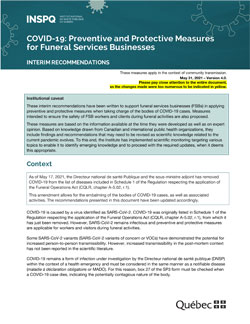COVID-19: Preventive and Protective Measures for Funeral Services Businesses
Institutional caveat
These interim recommendations have been written to support funeral services businesses (FSBs) in applying preventive and protective measures when taking charge of the bodies of COVID-19 cases. Measures intended to ensure the safety of FSB workers and clients during funeral activities are also proposed.
These measures are based on the information available at the time they were developed as well as on expert opinion. Based on knowledge drawn from Canadian and international public health organizations, they include findings and recommendations that may need to be revised as scientific knowledge related to the current pandemic evolves. To this end, the Institute has implemented scientific monitoring targeting various topics to enable it to identify emerging knowledge and to proceed with the required updates, when it deems this appropriate.
Context
As of May 17, 2021, the Directeur national de santé Publique and the sous-ministre adjoint has removed COVID-19 from the list of diseases included in Schedule 1 of the Regulation respecting the application of the Funeral Operations Act (CQLR, chapter A-5.02, r.1).
This amendment allows for the embalming of the bodies of COVID-19 cases, as well as associated activities. The recommendations presented in this document have been updated accordingly.
COVID-19 is caused by a virus identified as SARS-CoV-2. COVID-19 was originally listed in Schedule 1 of the Regulation respecting the application of the Funeral Operations Act (CQLR, chapter A-5.02, r.1), from which it has just been removed. However, SARS-CoV-2 remains infectious and preventive and protective measures are applicable for workers and visitors during funeral activities.
Some SARS-CoV-2 variants (SARS-CoV-2 variants of concern or VOCs) have demonstrated the potential for increased person-to-person transmissibility. However, increased transmissibility in the post-mortem context has not been reported in the scientific literature.
COVID-19 remains a form of infection under investigation by the Directeur national de santé publique (DNSP) within the context of a health emergency and must be considered in the same manner as a notifiable disease (maladie à déclaration obligatoire or MADO). For this reason, box 27 of the SP3 form must be checked when a COVID-19 case dies, indicating the potentially contagious nature of the body.
Although as of April 6, 2020, Funeral Services Businesses (FSBs) are no longer required to obtain authorization from the Direction de santé publique (DSPublique) for their territory (their regional public health department) when taking charge of the bodies of COVID-19 cases, it is recommended that FSBs contact the DSPublique for their territory for any other matters that arise after the body is taken in charge at the place of death that are not specifically covered in this document or by a directive of the Ministère de la Santé et des Services sociaux (MSSS) (the department of health and social services).
Also, deaths may occur in persons under investigation for COVID-19 or who are suspected of having had COVID-19 at the time of death. In such situations, it is the responsibility of either the physician or the nurse who draws up the attestation of death, or of the DSPublique, to transmit to the FSB the recommendations that apply, taking into account certain criteria and the result of a post-mortem diagnostic test if indicated. The instructions regarding this subject are available in the Guide de gestion des décès de COVID‑19 (in French only) intended for health and social services facilities, public health departments and FSBs.
Finally, the management of deaths during a pandemic must include a method for managing the risks of contamination not only by the body, but also among funeral workers and among participants in funeral events. Certain general rules for the protection of the health of workers apply; these recommendations are set out in Annex 1 of this document.
Last update in French : June 17th, 2022


